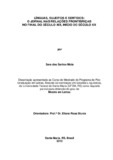| dc.creator | Mota, Sara dos Santos | |
| dc.date.accessioned | 2010-03-05 | |
| dc.date.available | 2010-03-05 | |
| dc.date.issued | 2010-02-10 | |
| dc.identifier.citation | MOTA, Sara dos Santos. LANGUAGES, SUBJECTS AND SENSES: THE ROLE OF NEWSPAPERS IN BORDERLINE RELATIONS AT THE END OF XIX CENTURY AND BEGINNING OF XX CENTURY. 2010. 106 f. Dissertação (Mestrado em Letras) - Universidade Federal de Santa Maria, Santa Maria, 2010. | por |
| dc.identifier.uri | http://repositorio.ufsm.br/handle/1/9815 | |
| dc.description.abstract | This study focus on the borderline region that is constituted by the cities of Santana do Livramento and Rivera (Brazil-Uruguay), considering the period between the late years of the XIX century and the early years of the XX century. At that time, such communities were in urbanization and industrialization processes and trading relations between both populations were intense, which provided the exchange of subjects and languages. In order to approach subject-language relation in a bordering space, we explored the conception of border and its links to the notions of space and territory based on areas of Geographic Studies such as Geopolitics and Human Geography. Since we consider many ways of space appropriation, that are built in practices experienced by the populations which inhabit such bordering region, we came to a definition of bordering territory , featuring them as new territorialities that transform the borderline place into a socially appropriate and mutually shared space. Once we defined bordering territory , we historically characterize it, having into account the period of municipalization of the referred cities until the early years of the XX century. Afterwards, we review studies on Portuguese-Spanish linguistic contact in the bordering region Uruguay-Brazil by Lingüística Fronteriza researchers, following the path of such studies and pointing to new ways of treating such languages as linguistic study objects, especially to Enunciation Semantics in which this study is inserted. Considering the newspaper a space in which bordering relations materialize, we approached the relationship of subjects and languages, enunciated in such borderline, from advertisement textual fragments published in newspapers from Santana do Livramento. In our analysis, we followed different perspectives on the selected enunciate sequences and we aimed to interpret the senses constituted by the languages and for the borderline linguistic environment when languages are politically distributed by speakers that enunciate them in the bordering territory in such socio-historical conditions. | eng |
| dc.description.sponsorship | Coordenação de Aperfeiçoamento de Pessoal de Nível Superior | |
| dc.format | application/pdf | por |
| dc.language | por | por |
| dc.publisher | Universidade Federal de Santa Maria | por |
| dc.rights | Acesso Aberto | por |
| dc.subject | Território fronteiriço | por |
| dc.subject | Jornal | por |
| dc.subject | Relação sujeito-língua | por |
| dc.subject | Fronteira | por |
| dc.subject | Sentidos | por |
| dc.subject | Bordering territory | eng |
| dc.subject | Newspaper | eng |
| dc.subject | Subject-language relation | eng |
| dc.subject | Borderline | eng |
| dc.subject | Senses | eng |
| dc.title | Línguas, sujeitos e sentidos: o jornal nas relações fronteiriças no final do século XIX, início do século XX | por |
| dc.title.alternative | Languages, subjects and senses: the role of newspapers in borderline relations at the end of XIX century and beginning of XX century | eng |
| dc.type | Dissertação | por |
| dc.description.resumo | Esta dissertação centra-se na região de fronteira constituída pelas cidades de Santana do Livramento e Rivera (Brasil-Uruguai), considerando o período compreendido entre os anos finais do século XIX e os iniciais do século XX. Na época, essas comunidades encontravam-se em processo de urbanização e industrialização e as relações comerciais entre suas populações eram intensas, colocando em circulação sujeitos e línguas. Para tratar da relação sujeito-língua em um espaço fronteiriço, questionamos o conceito de fronteira e sua imbricação com as noções de espaço e território fundamentando-se em áreas dos estudos geográficos como a geopolítica e a geografia humana. Ao considerar diversas formas de apropriação do espaço que se constroem nas práticas vivenciadas entre as populações que habitam essa região de fronteira, chegamos à definição de território fronteiriço , caracterizando-as enquanto novas territorialidades que transformam a fronteira em espaço socialmente apropriado e mutuamente compartilhado. Uma vez definido o território fronteiriço , o caracterizamos historicamente, abarcando o período de municipalização das referidas cidades até os primeiros anos do século XX. Posteriormente, retomamos os trabalhos desenvolvidos sobre o contato linguístico Português-Espanhol na região fronteiriça do Uruguai com o Brasil pelos pesquisadores da Lingüística Fronteriza, traçando um percurso dessas pesquisas e apontando novas formas de tratar tais línguas enquanto objeto de estudos linguísticos ao nos inscrevermos teoricamente na Semântica da Enunciação. Ao considerar o jornal como um espaço em que as relações fronteiriças se materializam, abordamos a relação entre sujeitos e línguas enunciadas nesta fronteira a partir do recorte de textualidades publicadas em periódicos santanenses, como anúncios comerciais. Ao analisá-los, seguindo diferentes perspectivas de análise nas sequências enunciativas selecionadas, procuramos interpretar os sentidos que se constituem para as línguas e para a fronteira quando as línguas são distribuídas politicamente pelos falantes que as enunciam no território fronteiriço em tais condições sócio-históricas. | por |
| dc.contributor.advisor1 | Sturza, Eliana Rosa | |
| dc.contributor.advisor1Lattes | http://lattes.cnpq.br/6356872087811361 | por |
| dc.contributor.referee1 | Irala, Valesca Brasil | |
| dc.contributor.referee1Lattes | http://buscatextual.cnpq.br/buscatextual/visualizacv.do?id=K4732009E6 | por |
| dc.contributor.referee2 | Scherer, Amanda Eloina | |
| dc.contributor.referee2Lattes | http://buscatextual.cnpq.br/buscatextual/visualizacv.do?id=K4787503Z9 | por |
| dc.creator.Lattes | http://lattes.cnpq.br/7307557102781133 | |
| dc.publisher.country | BR | por |
| dc.publisher.department | Letras | por |
| dc.publisher.initials | UFSM | por |
| dc.publisher.program | Programa de Pós-Graduação em Letras | por |
| dc.subject.cnpq | CNPQ::LINGUISTICA, LETRAS E ARTES::LETRAS | por |


